| Shepherds of Christ Daily Writing |
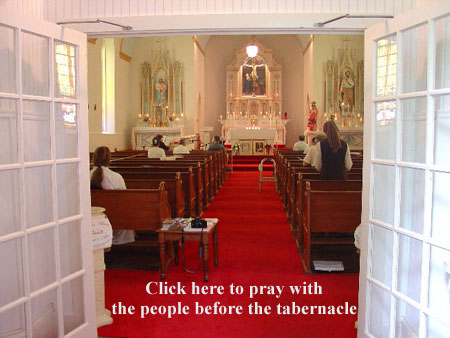 |
April 4, 2016
|
April 5th Holy Spirit Novena |
The Novena Rosary
Mysteries |
Florida Retreat
April 2nd - 5th
1:30pm and 6:20pmt
Please tune in!
Pray for special intentions.
Pray for Dan & Melanie, Jimmy,
Fr. Joe, Mary, Blue Book 16.
Please pray for funds & grace.
Give the gift that Counts.
Blow Out Sale for Reprinting of Blue Book 1, 2 & 3



While Supplies Last
Blue Book 1 - $4 each plus postage
Blue Book 2 - $4 each plus postage
Blue Book 3 - $3 each plus postageCall 1-888-211-3041 for Doris
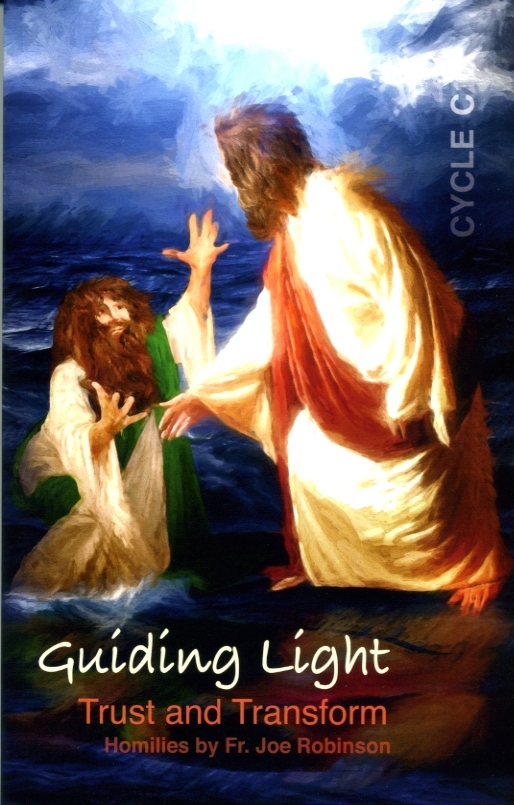
New Homily Book - Cycle C
Available $10.00 plus postage
April 4, 2016
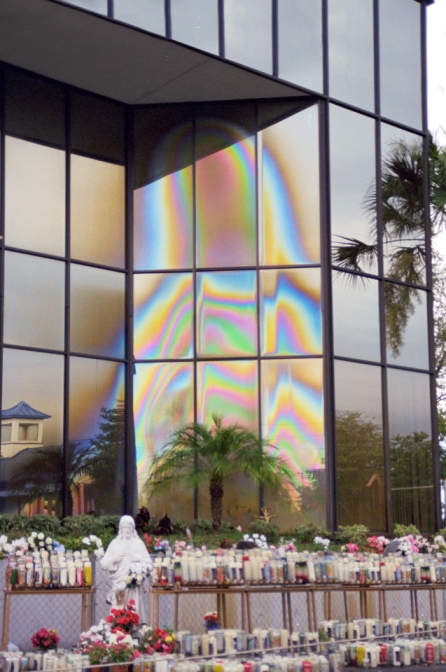
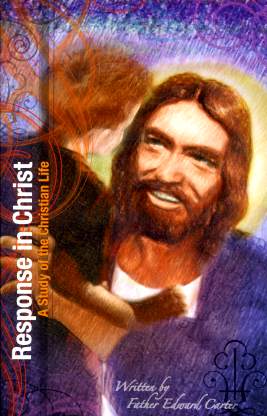
Excerpt from Response in Christ by Fr. Edward J. Carter, S.J.
The Christian Life of Grace (excerpt)
d) Relationship with Mary
Karl Rahner tells us that devotion to Mary is one of the great signs of
final perseverance.11 By such a statement Rahner emphasizes
for us the great role Mary exercises in the life of the Christian.
Really, the emphasis of Rahner is merely a continuation of the great
importance attributed to Mary by the Fathers, doctors, and saints of the
Church throughout the ages.
Mary assumes such a concrete importance in the life of each of us
because she is the mother of the Church and the mother of each
Christian. She is a mother to all men, but in a special way to the
Christian.12
Mary's spiritual motherhood toward us had its beginnings at the
time of the Incarnation. As Mary conceived Christ in a physical manner,
she at the same time conceived us in a spiritual manner. In her holy
womb she bore both Christ, the Head, and us, His members.
The second great stage in Mary's maternal relationship toward us was
accomplished upon Calvary. There, in extreme spiritual suffering, she
offered Christ to the Father. From the pierced side of Christ the Church
was born. Mary, in the extreme anguish of spiritual childbirth, brought
us forth to supernatural life. "Seeing his mother and the disciple he
loved standing near her, Jesus said to his mother, 'Woman, this is your
son'. Then to the disciple he said, 'This is your mother.' " (Jn 19:26).
The third and final phase of Mary's spiritual motherhood is a
continuing process. Under God, she gives us our life of grace. In her
maternal love she protects and nourishes this life. She intercedes for
all the graces necessary for its proper growth. As Mary cooperated with
the Holy Spirit in first giving Christ to men, so she continues the same
cooperation in regard to each Christian. Through the life of grace
Christ is meant to take deeper and deeper possession of each one of us.
Mary and the Holy Spirit continually labor to achieve this. Mary's only
desire for us is that we grow more and more into the full stature of
Christ. Her overwhelming love for us is evident. We manifest our love
for her by committing ourselves to her maternal love and care so that
she can achieve her desired purpose. That purpose, again, is to form
Christ in us.
Luke 1: 46-55
And Mary said:
My soul proclaims
the greatness of the Lord
and my spirit rejoices
in God my Saviour;
because he has looked upon
the humiliation of his servant.
Yes, from now onwards
all generations will call me blessed,
for the Almighty
has done great things for me.
Holy is his name,
and his faithful love extends age after age
to those who fear him.
He has used the power of his arm,
he has routed the arrogant of heart.
He has pulled down princes
from their thrones
and raised high the lowly.
He has filled the starving with good things,
sent the rich away empty.
He has come to the help
of Israel his servant,
mindful of his faithful love
—according to the promise
he made to our ancestors—
of his mercy to Abraham
and to his descendants for ever.
With Jesus: Intense Longing, Never Emptiness
February 13, 1994 10:00 p.m.
R. This is how it is with Jesus: if He loves me so intently, all I need is to love Him with all my heart and we create a union. He is a sure thing. We fade in and out and this hurts His aching heart. If I love you unconditionally, and one day you love me and one day you do not, then it hurts my heart. He wants our steadfast love.
To love someone in little glimpses, but not be able to behold Him, this is our love with Jesus. We do not touch, we do not even see His face, we only have a silent love affair to be actualized at some point. To know that some day we will be united totally to Him, we will forever be with Him! This is longing! When you love someone, you long for total union, to be with that person constantly, to see that person's face, to embrace and love that person.
We must suffer this separation from Jesus now--to know Him a little, but never enough, to want to see Him, but only love Him silently. This is the only way I can be with Jesus now. I must accept this because this is all I can have now. He gives us close moments of His love sometimes, but the heart expresses many emotions: joy, sorrow, longing, wanting, emptiness. With Jesus there is intense longing, never emptiness, an ache in your heart for more, but inability to stop it.
Teach Us to Love You and One Another (A Prayer)Lord, give me all I need to have a closer union with You. Possess my soul, permeate my being, use me as Your vessel to do Your work. Satan constantly wants us to demand the ways of ourselves. Let me die to self and think first of Your glory. Let me reach with my soul and not my body to know You more. Open me to the realm of the soul. Holy Spirit, Spirit of love, teach me how to love all people spiritually. Teach me the ways to love. I am Your child. I reach out to You to give me these gifts.
Spirit of love, teach me Your way of love. Teach me to love as God wants me to love. Teach me to love God as You so desire. Teach me all I need to love You and my neighbor. I love You, God.
end of excerpt
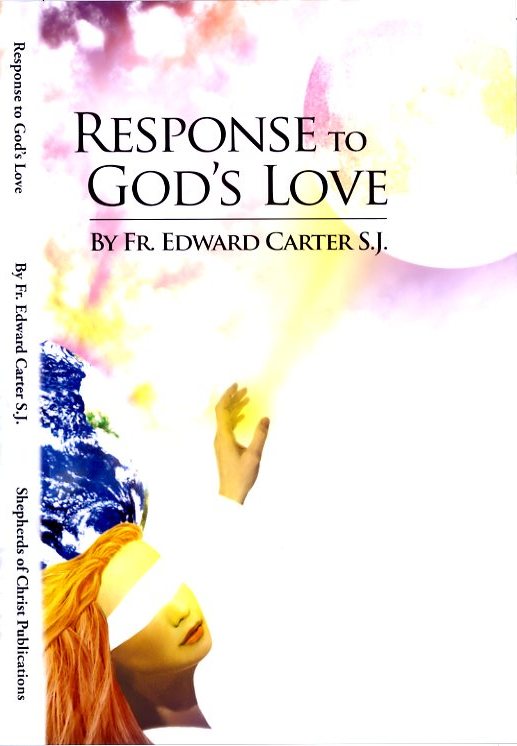
From Response to God's Love by Edward J. Carter, S.J.
Incarnationalism and Transcendence (excerpt)
Fr. Carter Says:
...This profound union of body and soul
can be considered from the standpoint
of the body being at the service of the soul;
in other words, the incarnational aspect,
the body, serves the
transcendent aspect,
the spirit.
In this statement, we see a fundamental
principle—namely, the incarnational
is ultimately intended to serve the
transcendent. This is the
hierarchy
found in Christ himself, the prime
analogate of incarnationalism-transcendence.
Although Jesus is not a human person, he did and does possess a complete human nature. He was and is fully human in this sense, a point that is stressed in all its implications by contemporary Christology. Yet the human in Christ—the incarnational in Christ—always did and always does perfectly serve the divine person—the ultimate transcendent in Christ. This is the structure that must always be followed as the Christian blends the incarnational and the transcendent.
The Christian's body aids the spirit in so many ways. The body, for example, allows for the incarnation of the grace-life that is rooted in the depths of the spirit. Our bodies also allow for the sacramental aspect (visible manifestation) of the Christ-life. Just as Christ's own life of grace tended toward epiphany—toward manifestation, toward sacramentality—so does ours, and our bodies make this possible.
There are various examples that show us this. The graced love of a mother incarnates itself in the warm embrace of her child. This incarnate love means so much to the child that, as psychologists tell us, harm can result if this externalized maternal love is not sufficiently present. The love between Christian wife and husband, elevated by the sacrament of marriage, is also meant to be incarnated through the body—not only through the marital act, but also through the kind word, the warm embrace, and the tender kiss. If there is not a sufficient degree of externalized love existent between a husband and wife, their love for each other can become less than ideal. More examples could be cited, of course, but the point is that our bodies allow us to incarnate our grace-life; our bodies permit us to "breathe out" this life.
Our bodies also allow us to "breathe in" relative to this life. The spiritual life must be nourished in so many ways from the exterior. We hear a particularly inspiring homily, for example, and this experience can significantly influence our spiritual life. Through our bodies, we experience the love that a friend shows us; this love energizes us and aids us in more perfectly giving ourselves in love to others. We walk along the seashore, our senses vibrate with the freshness of God's creation, and our hearts swell with gratitude to God for being alive.
In various ways, then, our bodies, sharing in the holiness of Christ's body, are involved with the life of grace and serve this life. A caution must be given, however: the body does not automatically remain docile to the intellect and will. The body has strong tendencies that must be controlled and directed by the spirit. If these tendencies are not properly controlled, they will weaken or even destroy the spiritual life rather than nobly serve it. This fact reminds us of our earlier discussion of the necessity of a healthy asceticism or self-discipline.
Involvement with the World
Our corporeal nature situates us in a world of space and time with its various terrestrial values. We have previously treated the Christian's encounter with the world. Because involvement with the secular is such a key dimension of incarnationalism, however, it is entirely fitting that, here and now, we emphasize a few major ideas regarding this particular issue.
Jesus has inserted himself irrevocably into our world. Through his human enfleshment, Christ has uplifted and transformed both humanity and the creation that surrounds humanity. Speaking of Christ, St. Paul tells us: "He is the image of the invisible God, the first-born of all creatures. In him everything in heaven and on earth was created, things visible and invisible, whether thrones or dominations, principalities or powers; all were created through him, and for him. He is before all else that is. In him everything continues in being. It is he who is head of the body, the church; he who is the beginning, the first-born of the dead, so that primacy may be his in everything. It pleased God to make absolute fullness reside in him and, by means of him, to reconcile everything in his person, both on earth and in the heavens, making peace through the blood of his cross" (Col 1:15-20).
We also find this recapitulation theology—that is, the summing up and union of all things in Christ—in the writings of the Fathers of the Church, in, for example, the writings of Athanasius, Hilary, Augustine, Ambrose, and most especially in Irenaeus.
In our own time, Christ's vital insertion into the world has been emphasized by numerous writers and theologians. The theology of Vatican II has also given a great impetus to the realization that the Church and the Christian belong very much to the world. Perhaps, as never before, the Church is realizing the various ramifications of the Incarnation. In assuming a human nature, the Son has manifested his enduring concern for mankind and all of mankind's authentic values. The Church and the Christian must perpetuate this incarnational concern.
As contemporary Christians, we must be willing to give ourselves to furthering all the authentic interests of humankind. We must be persons for others, as Christ was before us. As Jesus was the suffering servant, so also must we put ourselves at the disposal of others and their legitimate earthly concerns. The forms of Christian service can run the gamut of possibilities; whether as a cloistered contemplative or the most terrestrially involved lay person, the Christian must deeply love this world and make a significant contribution to its evolutionary growth in Christ.
We, today's Christians, must relate as deeply as possible to the world's family. We must share the agony of minorities as they attempt to emerge to their rightful position in society. We must be willing to share our material resources with the starving, the diseased, and the uneducated. We must be willing to help the faithless and despairing portion of the human race arrive at an understanding of the true meaning of life. The great problems of local, state, and federal government must also receive our practical concern. Moreover, we must also want to share the brighter side of life. Through us Christians, people of today must be made to realize that Christianity wants to rejoice with them, wants to share in their zest for life and in their aspirations for the future.
In every possible way, then, the Church and the Christian, must, without sacrificing principle, identify with modern men and women and their world. Christianity is unmistakably incarnational; it is meant to be perennially involved with the temporal order. As we have seen, however, the Christian life not only has an incarnational dimension; it also has a transcendent aspect. This is the way that Christ has structured Christianity. He entered this world in human form to raise the human race and the world to a new level of existence, to a share in the transcendent holiness of God. Consequently, the Christian is being disloyal to both Christ and the world if his or her incarnational involvement is not opened toward transcendence. To the extent that the secular and the incarnational are cut off from the transcendent, they will tend to wither and die regarding their true existence. Consequently, we must labor against the self-enclosement tendency of the secular and work, instead, for its proper openness to life-giving transcendence.
Structure in the Spiritual Life
One of the results of Christ's Incarnation is the necessity for a certain degree of external structure in the Christian life. The fact that God has communicated himself to us through the concrete, visible humanity of Christ gives rise to such a structure; this exterior structure of our grace-life flows from various realities that are contained in the humanity of Jesus. God's grace, for example, has come to us through Jesus who was visible and social in his humanity. To insure the continuity of this visible and social dimension of God's self-communication, Christ established his Church. The Church, as a visible and social or communal organization, means an external structure.
The Christian, then, who tends to rebel against structure, is actually rebelling against the law of Incarnation. The Church's structure is meant to serve the Christian community in relating properly to God and the world in faith, hope, and love. To put it another way, the Church's structure is intended to aid her members in living according to the Holy Spirit.
To say this, however, is not to say that structure in the Church always fulfills its function perfectly, or that it fulfills its function perfectly at any time. The Church's structure is shaped by both God and us. Insofar as it is shaped by us, it will always be less than perfect—indeed, sometimes it will be very imperfect. To expect otherwise is to fail to penetrate the implications of the human creature as frail and finite.
All the members of the Church do not experience structure in the same way. The various states of life must deal with structure differently. If different situations of structure face us according to our various vocations, however, there is this common feature—all of us must strive to maturely relate to structure. On the one hand, we must not become overly dependent on structure and tend to make an end out of a means. A person who so acts can become deeply disillusioned, and even experience a crisis of faith as he or she perceives the disappearance of some former Church structures. This person, who has mistakenly equated Christianity with a particular form of Church structure, is rather immature. He or she has depended too much on structure or has given structure a misguided emphasis.
On the other hand, we must avoid another form of immaturity regarding structure—namely, the tendency to rebel against structure. Difficult though it is at times, we must be convinced that structure is one manner in which God's will comes to us—not the only way, to be sure, but one way. Because law is one form of structure, what Rahner says about our relationship to the law is relevant to our point of discussion: "But the only way of knowing whether we have the Holy Spirit in us is precisely by whether we fulfill the law" (Nature and Grace, p. 57). In reference to our present discussion, we can assure ourselves that we are living according to the Spirit only if, along with our conformity to God's will in other ways, we are trying to properly relate to structure. This conformity to structure is not the only criterion for life in the Spirit, but it is one standard of judgment. This is not to say, however, that external structure can never give way to what prudently seems to be a divergent manifestation of God's will that can appeal to certain moral principles (that of epikeia, for instance). Obviously, too, we can never fulfill the demands of structure if sin is involved. Finally, it is an aspect of God's will for us that we take all reasonable means to change structure within the Church if we judge that a particular structure is actually failing to properly serve the faith, hope, and love of the People of God.
This last point leads to our final remark on structure. In terms of incarnationalism-transcendence, structure within the Church pertains to the incarnational aspect. As is the case with all incarnational elements, this particular form of incarnationalism is meant to serve the transcendent life of grace that is centered in faith, hope, and love. The Christian is always intended to transcend structure; whether we observe the Church's structure, in any of its multitudinous forms, as relatively perfect or very imperfect, we are nevertheless meant to transcend it. In other words, whatever authentic stance we take before structure, we are always simultaneously going beyond it in deepened faith, hope, and love.
Change and Permanence
The reality of structure in the Church's life, and structure's openness to change, logically lead us to another application of incarnationalism and transcendence—namely, change and permanence in the life of Christian holiness. First, we will consider aspects of the life of grace that are changeable—the incarnational aspect. Then we will consider aspects of the life of grace that are essentially permanent—the characteristic of transcendence is applicable.
In becoming man, Jesus inserted himself into a particular historical milieu. As a result, the self-communication of God that was mediated by Christ was adapted to the historical structures of those times. In preaching his message, for example, Jesus respected the language and thought categories to which the Jewish people were accustomed.
From age to age, there must always be a certain re-incarnation of the mystery of Christ that is a continuation of the historical dimension of the Incarnation. In becoming man, Jesus has assumed the historical, evolutionary dimension of mankind. The Church and the Christian, for their part, must respect this historical dimension of the mystery of Christ. Consequently, just as Jesus, in his historical existence, adapted himself and his message to the people of his time, the Church must likewise act. She must present the mystery of Christ to succeeding ages in a relevant manner, without, of course, compromising the Gospel message. To phrase it somewhat differently, the Church must preach Christ according to evolving historical structures. As a corollary of this, it is clear that the Christ-life of the Christian will be exposed to the same re-incarnation process, to the same historical evolution of the mystery of Christ.
Change in the life of the Church, then, is inevitable; it is simply one application of the law of incarnation. This is not to say that it is always easy to properly relate to change. Some Christians wish to bring about change too rapidly, or to change in the wrong way; others resist change and the process of legitimate experimentation that at times must accompany prudent change.
Important as change is in the life of the Church, it is not the only reality. All change is intended to both facilitate our openness to God's ongoing self-communication and promote covenant life. Change, then, is meant to serve the Church in her transcendence, which, for both the Church and the Christian, is the life of grace. This life of grace is essentially the same throughout the ages, although its means of growth and expression can change to a certain extent. Why is the life of grace always essentially the same? Because it is a participation in the life of God, which is dynamically unchangeable. God is infinite life; he can become neither less nor more than he is. Furthermore, we receive our participation in trinitarian life through Christ. One implication of this fact is that this life of grace will always be lived according to the pattern that Christ has established. At the heart of this pattern or structure, as we have noted many times, is death-resurrection. This pattern of the Christ-life is essentially transcendent and fundamentally the same in all ages of Christianity.
We must be aware of the need to balance these elements of change and permanence in the spiritual life. To reiterate, then, we should not resist legitimate change in the Church, nor should we be so concerned with change that we tend to use it as an escape. In this case, we allow an overconcern with change to deafen God's inexorable call that bids us to grow in holiness. We can also misuse the enthusiasm and novelty that are connected with change by allowing them to blur the way to holiness—the way of Christ—a way that, although it is difficult, is nonetheless tremendously fulfilling.
Personal Vocation and
Incarnationalism-Transcendence
Every Christian must strive to assimilate incarnationalism-transcendence in a balanced way. The manner in which each Christian balances these characteristics will depend upon various factors. The proportion of both incarnationalism and transcendence, for example, will depend to a degree upon one's basic vocation: the lay state, with all its temporal involvements, is more incarnational than the clerical and religious state. Another important factor that determines the desired balance is the personal graces that God allots to an individual. Grace might lead to a greater degree of incarnationalism at one stage of a person's life, and to a lesser degree at another time.
In conclusion, let us repeat that incarnationalism is always meant to serve transcendence. Let us also remember that both should always be found simultaneously in the life of each of us, for as Christians we are assimilated to Jesus—the Jesus who is both incarnate and transcendent.
Give the gift that keeps giving.

Blue Book 1 & 2 – $4.00 each plus postage
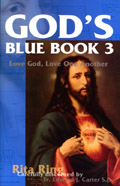






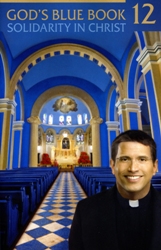

Blue Books 13, 12, 11, 10, 9, 8, 7,
6A, B, C, 3 –
$3.00 each plus postage


Blue Books 4 & 5 –$2.00 each plus postage


Blue Books 14 & 15 –$5.00 each plus postage
The more you use the Blue Books and
become one with Jesus – more
intimate with Jesus –
the more your lives are a blessing and
everything you do in life can help
to bring down great grace for the world
because of your being so
one with Jesus.
Guiding Light Homily Book Series
Fr. Joe’s Books
Cycle A –
Steadfast to the Son
Cycle B –
Focusing on the Word
Cycle C –
Feed My Soul
Cycle A –
Inspired to be Genuine4 for $20 plus postage of $5.95
These books can be given to:
1) All Priests
2) Good for Music Ministers
7) Good for Mom and Dads
3) Good for DRE's
4) Good for Deacons
5) Good for Principals of Schools
6) Good for Teachers
Given March 21, 2014
R. Pray for These Things
1) Pray for the Pope & hierarchy to help us start prayer chapters.
2) Pray for Dan, Sally Jo, Richard, Carol, Margaret, Sue,
Jack, Jean, Amanda, Matthew, Special intentions.
3) Pray for the priests, the Church and the world!
4) Pray for the spread of prayer chapters,
also for the spread of priests doing prayer chapters.
5) Pray for the spread of Blue Books.
6) People going to Florida and China.
7) Vocations to all 7 categories.
8) Pray for spread of Consecration and Rosary.
9) Pray for pope helping us.
10) Pray for Jeff - sales & health. Pray for Nick.
11) Blue Book 16 and cover and all involved.
For our Publisher and all involved
12) All intentions on my list, Jerry's list.
13) Priests getting Fr. Joe's book.
14) Pray for Fr. Joe's new book, cover & funds for printing & postage.
15) Donors and members and their families.
16) Healing of the Family tree.
17) Dan & Melanie, Catherine & mom, Gary, Mary Jo,
Jim & statues, Fr. Ken, Monsignor, Kerry, Tom & wife.
18) All who asked us to pray for them.
19) All we promised to pray for.
20) Rita, John, Doris, Sheila, Jerry, Regina, Sanja,
Betty, Sophie, Lisa, Eileen, Fr. Mike, Louie, Laverne,
2 Dons, Mary Ellen, Fr. Joe, all priests helping us,
Ed, Jimmy, Steve, a special couple, Rosie & all involved.
21) 2 babies and moms.
22) Funds and insurance.
23) Jerry's garage.
24) In thanksgiving for gifts, graces, & blessings received.
25) Spread the Blood of Jesus on all of us here.
26) Consecrate all hearts.
27) Cast the devil out of all of us here and all in Movement.
The Wedding Rosary
Crystal Image Rosary
$40 plus shipping
Original Image Rosary
8mm glass beads
in a matching gift box$40 plus shipping
Give the gift that counts.
Give to your priests Fr. Carter's Books plus postage.
Tell My People $5.00
Response to God's Love $8.00
Response in Christ $8.00
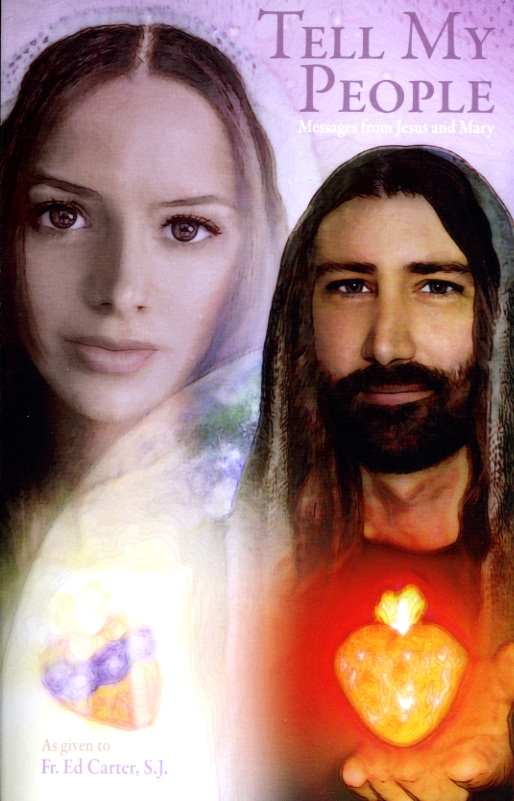

Old Mass Books with the Imprimatur
$2.00 plus postage
New Mass Book with Imprimatur
$8.00 plus postage
New Parents & Children's Book with the Imprimatur
$8.00 plus postage
Fr. Joe's Cycle A – Steadfast to the Sun – Starts in Advent
$5.00 plus postage
Give the gift that keeps on giving!
Give to your priest.
Fr. Carter's Priestly Newsletters Book II
$6.00 plus postage
Get a canvas print of Mary's image
with a sliver of glass and a little
bottle of Jesus and Mary water.
The glass will be fixed behind the
back of the picture.
$200.00 plus postage
Shepherds of Christ Ministries
P.O. Box 627 China, Indiana 47250
Telephone: (toll free) 1-888-211-3041 or (812) 273-8405
FAX: (812) 273-3182
Copyright © 2014 Shepherds of Christ.
Rights for non–commercial reproduction granted:
May be copied in its entirety, but neither re–typed nor edited.
Translations are welcome but they must be reviewed for moral and
theological accuracy by a source approved by Shepherds of Christ Ministries
before any distribution takes place. Please contact us for more information.